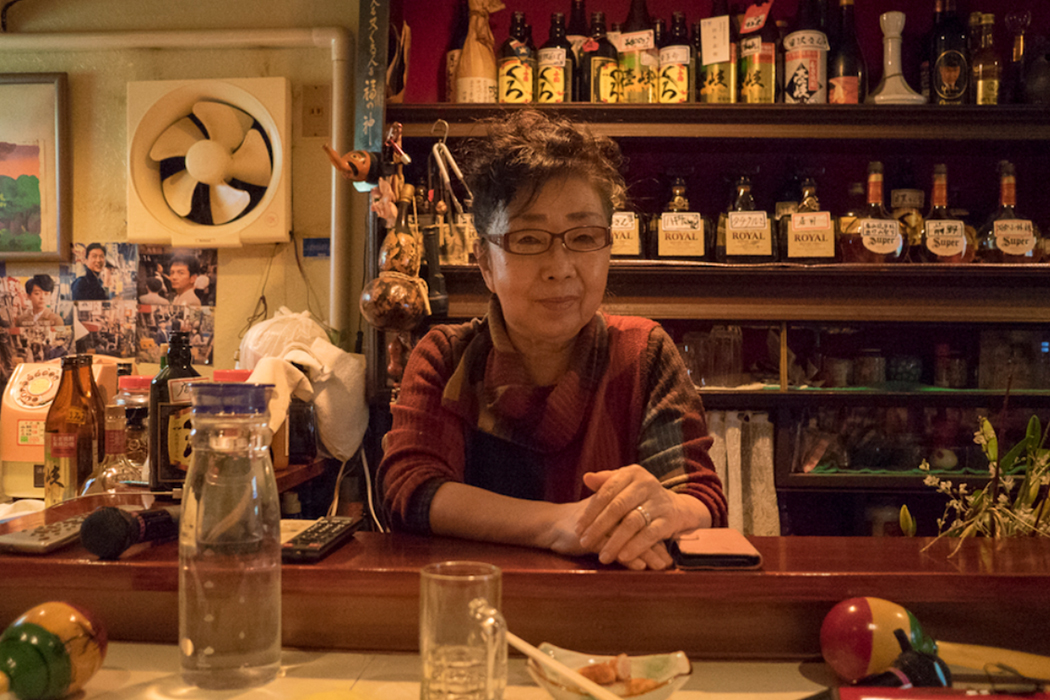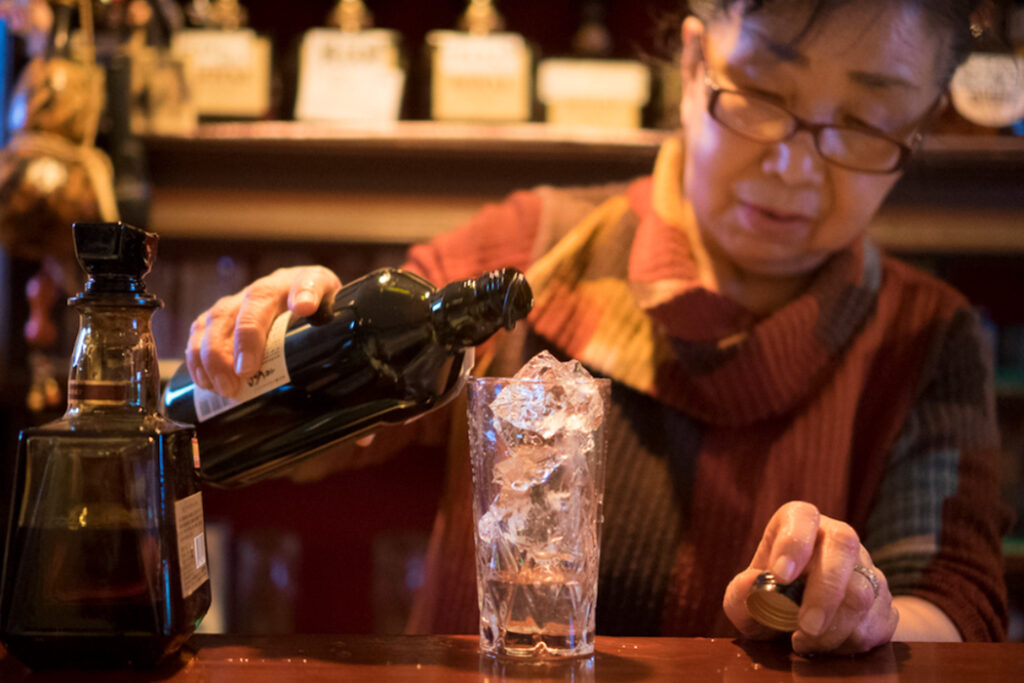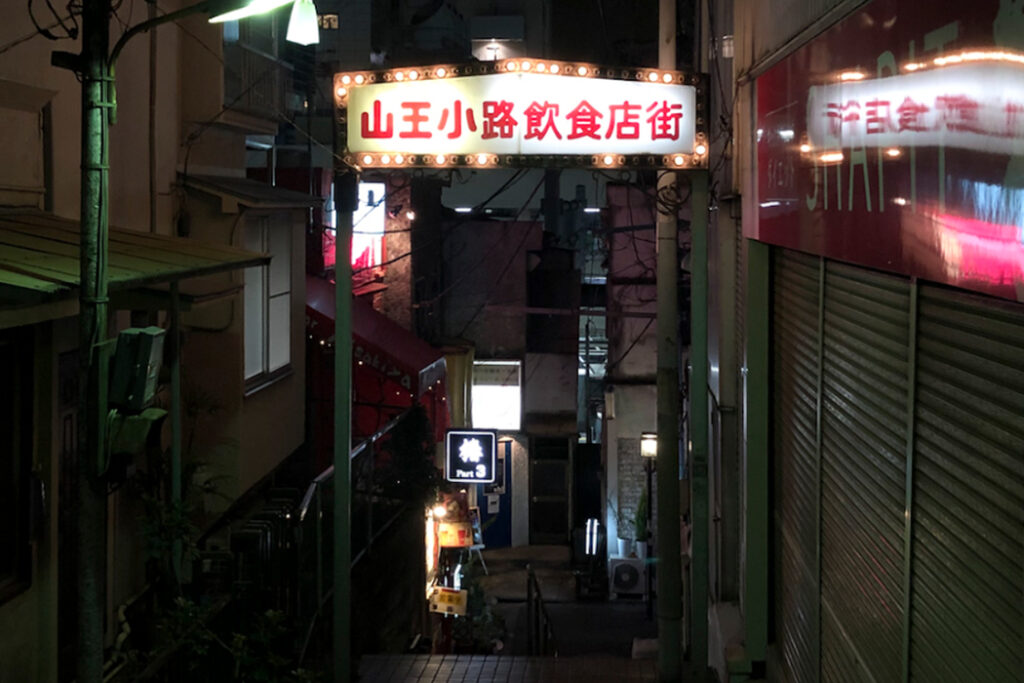Kumi-san, Kumi

Through an acquaintance I once worked with, I met a young Japanese guy who spent a lot of time at snack bars in his local neighborhood. He showed me a hidden street in Omori, a suburb below Shinagawa, located in south Tokyo. As many small congregated snack alleys I’ve stumbled upon before, this was one of the more quaint, yet haphazard, collections I’d seen. I met my new snack-hopping pal for a pre-drink at a colorful bar that had mismatching pink chairs, a couch and an old kitchen table aside the counter bar. At the bar sat a dog wearing a jacket sitting like he was a customer. Two other patrons paid him no mind. This was not the snack we came to interview at, so we finished our drinks and small dish of miso-covered mini-squids and made our way to the main mama of the night: Kumi.
Kumi (the bar, named after Kumi the mama) was narrow but not too cramped. One wall was plastered with photos of her favorite customers, all smiling alongside her. Posters of enka (a classic genre of Japanese music from the Showa-era) singers, a large vase with flowers and a few old-timey sake bottle gourds hung around the bar. Over in the corner I noticed a large frame too big for the photo it was showcasing, a shaded cell from the wildly famous animated show Pokemon. Kumi-san told me her son is an animator on the show. Although her demeanor was relaxed and unimpressed as if she had seen all that life had to offer, I couldn’t help but notice an amused smile playing at the corner of her mouth as she spoke.


Alex: What does a snack mama do?
Kumi: We have conversations and take care of their clients. We make sure the clients are always having a good time, conversing with them and pouring alcohol. I started over 40 years ago, I’ve been a mama for 46 years. I was in my mid-20s when I started. I started the snack to make money, because mizu-shoubai is the easiest. But I know it's not all me. I want to thank the girls, the bartender and clients for supporting me. I’ve been in this location (Omori) for 30 years now. I love people. I just love socializing.
Alex: Have you had any bad experiences?
Kumi: I’ve seen people get kidnapped. I think it's kind of like the North Korea situation. The yakuza (Japanese mafia) gave me a difficult time. They wanted me to pay a fee for having my snack in the area. This was about 40 years ago. Everyone told me I shouldn’t pay so I never did.
Alex: Has the snack culture changed over time?
Kumi: Yes, people used to spend way more money. The companies used to pay for cabs but now everyone goes home on the last train so they don’t stay out as late as they used to. Most people go to Izakaya after work for drinks now. I think people have more options of things to do or places to drink. I also knew a lot more snack mamas back in the day but now they’ve all retired.
At this point in the night, a Karaoke repairman came into the shop to fix some wires. We engaged him about the history of Karaoke in snack bars, the mama also adding in her experience over the changing times.
Kumi: The first karaoke machine was an 8-track, 40 years ago. Only eight songs per cartridge. We had a book of lyrics and the machine was only for playing music, there was no screen with lyrics to follow. Then it became video, CD and laser disk. Before karaoke machines, it was a live band called “Nagashi”, and you would pay ¥1000 (~$10) for three songs and they would play live requests for you to sing over.
Alex: What type of clients do you get?
Kumi: They are old. I’m old. I’d say 70% are 50-60 year olds and maybe 30% are 20-30 year olds. Most of them are classy. I don’t know if they are rich or not. They are rich in the heart, where it counts. I never let any sketchy people in my place.
Just then the door opens and a drunk man tries to come in but Kumi says they are full for the night (there were a couple seats open). He said he knew her and she said “Oh? I don’t remember you,” and he insisted she knew his friend. She wasn’t interested in having him so she simply and effortlessly turned him away. He leaves without incident. Kumi keeps the atmosphere fun and balanced with the right combination of customers she trusts.
Alex: What are your concerns for Japan’s future?
Kumi: I won’t be alive! I don’t know! (Kumi laughs) I guess I’m worried about after I retire and the pension. The pension system is a concern for all of us. We are not going to be able to rely on it.
Alex: What do you do in you free time? What are your hobbies?
Kumi: Sleep. My husband works, and my kids are gone, so I’m bored. But I have many hobbies! Uh… like…
[A woman sitting at the end of the counter is laughing quietly to herself and I ask her why she’s laughing. Eventually, Kumi reveals her true hobby]
Ok, ok, I play Mahjong!
[The woman at the counter tells us she used to own a secret Mahjong parlor and that is how her and Kumi met. They seem to be very close friends.]
I don’t want to just sit around and wait for death. Live life to the fullest!
Alex: What would be your advice for future snack mamas?
Kumi: Be a good listener.
Find the interviews with the other snack mamas here: